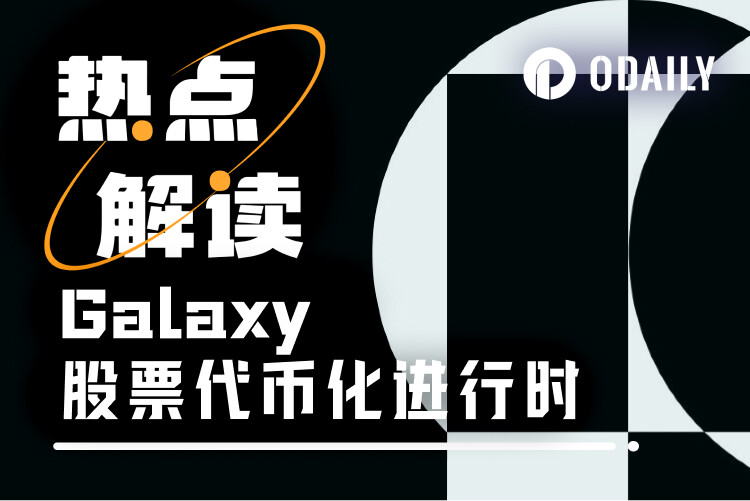原创|Odaily 星球日报(@OdailyChina)
作者|Wenser(@wenser 2010)
股票代币化,被视为加密货币行业对传统金融体系发起的一场变革,其目标是将加密触角深入股票市场,并逐步重塑其交易规则。继 Robinhood、xStocks 等平台推动美股代币化后,部分上市公司也开始主动拥抱这一趋势。8 月 5 日晚间市场消息称,美股上市加密巨头 Galaxy Digital 计划发行代币化股票 GLXY,并与 Robert Leshner 旗下的 Superstate 签署了 RWA(真实世界资产)平台合作协议。Odaily 星球日报将在下文对此进行简要分析,供读者参考。
美股代币化赛道变天了:当加密巨头选择“自我革命”
提起 Galaxy,很多人或许稍显陌生,但其早在2018年就已登陆加拿大多伦多证券交易所创业板,一跃成为“全球第一家成功上市的加密资产投资和管理公司”。今年 5 月,Galaxy 完成了从开曼群岛迁册至美国的重组,正式登陆纳斯达克,股票代码为 GLXY,由此成为加密货币行业的标杆性企业。
不仅如此,Galaxy 还有着“加密货币行业的高盛”的行业名头,此前 BitMine、Sharplink Gaming、Bit Digital 等 ETH 财库储备公司的背后也有其参与资产托管,借助6月、7月 ETH 财库储备公司的股价炒作,Galaxy 此前股价一度从6月初的 18.5美元暴涨至7月20日的30.59美元。截至撰稿前,Galaxy 股票盘后价暂报 27.21美元,24小时跌幅为 1.7%。根据链上分析师 Ai 姨统计,Rootdata 信息显示,Galaxy Digital 投资了 Sonic / Monad/ Ethena / Babylon / Plume 在内的 124 个项目,其中 2018-2019 期间投资 EOS 还获利了 7,120 万美元,投资回报率达 123%。其还曾在 Luna 事件中获利数亿美元,最终因 Luna 崩盘而被视为始作俑者之一被罚2亿美元。
此外,Galaxy 还是场外 OTC 的活跃中间商,最近一次引人注意的操作为帮助 BTC 早期投资者完成超过 80000 枚比特币的出售交易,按当时市值计算超过 90 亿美元,这也是加密市场历史上最大名义金额的比特币交易之一。
昨日,Galaxy 旗下纳斯达克上市子公司 Galaxy Digital 公布截至 2025 年 6 月 30 日的 Q2 财报,其净收入为 3070 万美元,总股本价值 26 亿美元,持有价值约 12 亿美元的现金与稳定币。得益于上文提到的“80000枚 BTC 交易”,其数字资产业务调整后毛利润达 7140 万美元,环比增长 10%。
另据链上分析师 Ai 姨监测,Galaxy Digital 目前在链上共持有约 9.21 亿美元资产,其中 BTC 持有量为 5119.73 枚(约 5.85 亿美元);ETH 持有量为 75,425 枚(约 2.68 亿美元);SOL 持有量为 151,196 枚(约 2451 万美元);此外还持有 1749 万枚 USDT 和 667 万枚 USDC。持有价值前五资产均为主流币和稳定币。
值得一提的是,Galaxy 的早期投资人行列里,少见地有亚洲面孔的参与——鸿海集团旗下的投资机构 HCM 资本就早早押注了 Galaxy Digital,此外,该资本机构还曾参与投资业内巨头 Digital Currency Group(DCG)。详见《加密货币投资银行 Galaxy Digital 上市!你可认识背后的中国投资人?》一文。
而集行业地位、资管规模、美股上市公司等光环于一身的 Galaxy 此次选择主动代币化自己的股票,或许有2方面的考虑:
一方面,或因Q2财报数据及业务表现稍显乏力,不及市场预期。尽管Galaxy Q2财报表现远超 Q1,甚至从Q1的2.95亿美元亏损扭亏为盈且调整后毛利润达 2.99 亿美元,但其资产规模的骤降(总资产规模下降 43% 至 63亿美元)、不确定性极大的监管环境与高风险高波动的市场,都让投资者完全相信其后续的市场表现,受此消息影响,财报发布后,其股价在盘前交易中下跌 7.6% 至 28.10 美元。
另一方面,或许是看中了股票代币化市场后续的爆发潜力。早在今年5月,Galaxy 创始人 Mike Novogratz 早就曾透露消息称,Galaxy DIgital 有意将自家股票代币化为 DeFi应用代币,具体应用场景包括借贷、交易等。作为加密货币行业巨头,Galaxy 认为“代币化美股”极具成长潜力,甚至可能创造出数万亿美元等级的新市场,7*24 小时交易、面向非美国投资者等特性将进一步释放市场流动性。当然,作为上市公司,其坦言,相关市场尚处初期阶段,并在 SEC 文件中审慎指出:代币化证券市场尚处于萌芽阶段,无法保证代币化 GLXY 未来能够发展出具规模且有序的流通市场。相较于像那斯达克这类受监管的国家级证交所,链上交易机制(如DEX)可能在流动性、成交量、透明度与监管架构等面向存在明显落差。
尽管如此,以目前市场进度来看,Galaxy 已迈出关键一步。
Galaxy 股票代币化合作方:Superstate 平台的 RWA 生意经
此次 Galaxy 股票代币化消息一出,该消息也得到了合作方 Superstate CEO、RobotVentures 创始人 Robert Leshner 第一时间的发文证实,后者正是知名 DeFi 协议 Compound 创始人。值得一提的是,此前纳斯达克上市公司 180 Life Sciences 宣布拟通过私募股权融资募集约 4.25 亿美元建立以太坊财库,交易完成后该公司将更名为 ETHZilla Corporation,而 Robert Leshner 也是投资人之一。
而 Superstate 与 Galaxy 的合作也早有预谋。
据了解,Galaxy 今年5 月就曾与 Superstate Services 签署“数字资产转入代币协议”(Digital Transfer Agency Agreement),正式委任该公司为自家数字资产的转让代理人;Superstate Services 则是 RWA 代币化平台 Superstate 的背后公司,后者曾因推出多个代币化私募基金(如 USTB 与 USCC)为市场所注意。
今年5 月,Superstate 曾推出名为“Opening Bell”的链上交易平台并联合多家机构向 SEC 提交框架提案。
彼时,该项目称将率先在 Solana 链部署,实现传统股权与区块链基础设施的原生融合,消除对 CEX 和传统上市机制的依赖,通过区块链设施提供连续交易和实时结算。“SOL 版微策略” SOL Strategies 将率先通过该平台将其普通股在 Solana 上链,使美股得以在链上直接流通。此事近期再次得到了 SOL Strategies CEO @LeahWald 的对外确认,其还强调:“与代币化包装不同,这是一种完全合规、可交易且与其基础证券无缝互换的股权”。
自此,Superstae 或许将成为后续越来越多加密概念股、美股选择链上代币化的不二之选。而基于 Robert Leshner 此前创立 Compound 的经验,或许还将进一步激活美股市场流动性流入链上市场,当然,前提是链上美股代币的交易体验要优于美股市场。
结语:内外合力,美股代币化迎来转折点
如果说此前 Robinhood、xStocks、MyStonks 等平台的美股代币化,更像是加密货币行业从外部对美股市场发起的“特洛伊战争”,尤其是 Robinhood 想要借助股票代币化对 SpaceX、OpenAI 等未上市公司的股权进行抢先定价;那么现在 Galaxy、SOL Strategies 等公司主动与RWA平台 Superstate 合作推动股票代币化的行为,则像是从内部自发掀起的“主动革命”——发挥自己深耕加密行业的优势,抢先一步推动股票市场与加密市场双方流动性的深度耦合。
至于 Galaxy 的股价以及业务表现是否能借此再创辉煌,就要看美股市场与加密市场是否吃得下其画下的“大饼”了。
免责声明:本文章仅代表作者个人观点,不代表本平台的立场和观点。本文章仅供信息分享,不构成对任何人的任何投资建议。用户与作者之间的任何争议,与本平台无关。如网页中刊载的文章或图片涉及侵权,请提供相关的权利证明和身份证明发送邮件到support@aicoin.com,本平台相关工作人员将会进行核查。



